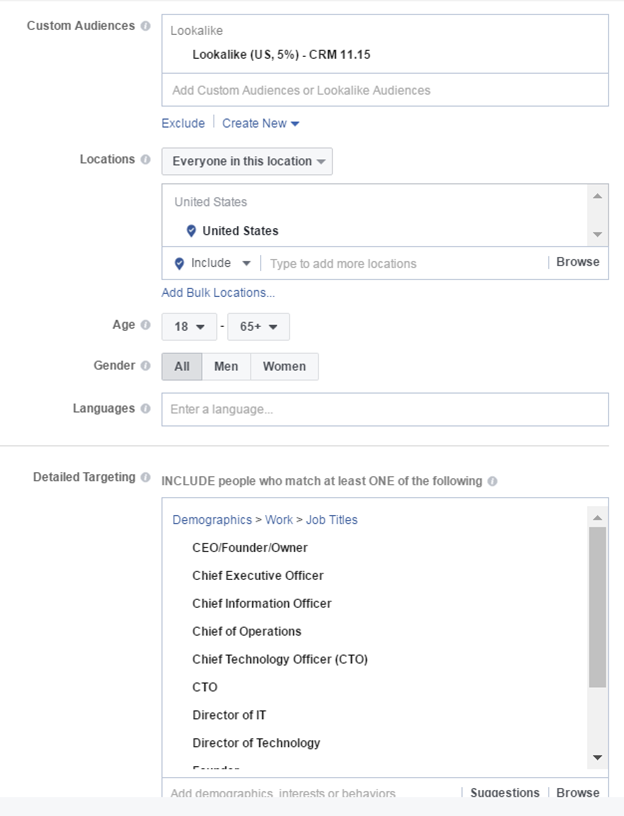When most people think Facebook advertising, they think B2C marketing.
Many tend to assume that B2B marketing on Facebook doesn’t make sense or would not be effective – because it would be too hard to get in front of professionals, decision makers, and the right industry positions, and even if you do, they’re not in the mood to think about business if they’re browsing Facebook.
These assumptions, however, are quite inaccurate – and with the right strategies and targeting in place, Facebook can indeed be an effective B2B platform. Below are three key strategies for how to make your B2B marketing successful on Facebook.
Build a layered Lookalike strategy
Lookalike audiences are one of Facebook’s most efficient targeting capabilities. First off, here’s a quick refresher: Lookalike targeting is where you can leverage your first-party data (e.g. customer lists, audience lists, etc.) as a seed audience and Facebook will take that list and target users who are very similar in characteristics, behaviors, and traits as that audience.
The capability is super-powerful, but rather than taking your entire customer list and using it as a seed list, you need to be smart about how to segment and leverage your first-party data.
1. Think about your customer list and how to segment it
To create an effective seed list, think about your customer list and whether you can segment that list into groups of identifiable characteristics. For example, let’s say you are a B2B cybersecurity company that sells cybersecurity to a variety of companies in different industries.
You may want to segment out your customer lists by the industries they are in – tech, medical, education, financial, etc. Keep in mind you’ll need a seed list of between 2K-5K users to be effective.
2. Upload the seed list you’ve developed to Facebook
Next, upload that seed list into Facebook and develop your lookalikes off of it. In most cases, I’d recommend that you build an audience of the 1% most relevant users, which tends to be the audience closest in similarities, characteristics, and traits.
However, for this strategy, you should keep your audience size fairly large in order to layer additional targeting to refine the list. I recommend a LAL 5% (LALs go from 1% to 10%), as a 5% will still find users similar to your seed list – but rather than receiving an audience size of 2M, you are going after a larger pool of 10M.
I know, you must be thinking that 10M sounds way too big!! Don’t worry – refinement is coming!
3. Start building your ad set
As you start building your ad set, you’ll be using your LAL 5% audience as your base audience to target. In other words, rather than targeting all of Facebook’s uses, you’re starting off with a more qualified audience given they are similar to your customers.
You’ll layer Facebook’s targeting options on top of this audience by selecting job/title targeting to find the decision makers in a company likely to be interested in your product.
You have now just leveraged Facebook’s various targeting capabilities to ensure that you are going after audiences similar to your customers and targeting true decision-makers.
Take advantage of third-party data
Remember that third-party data providers are your friend! You should consider partnering with third-party data providers such as Axciom and Datalogix in order to leverage their relevant lists.
Similar to what you can find within Facebook, you can also leverage their third-party lists and get in front of specific industry professionals and decision makers. This is a quick and easy way to identify relevant audiences and target them.
Engage users with video
Think about your business. Do your customers need to be educated? Are they conducting lots of research before they purchase? This is often the case with B2B companies who need to build a strong, long-term case to justify high price points.
An efficient tactic to avoid excessive clicks, yet get the job done on educating your audiences, is to leverage video ads. You’ll want to keep in mind that 30 seconds or less is the recommended time given people’s short attention spans – but that’s more than enough time to inform the users and get them into your funnel.
And Facebook automatically builds audience lists based on how long users have viewed your video (e.g. 50%, 75%, 100%), so you can segment by level of interest.
Next, you can create an ad set and remarket with static and carousel ads towards specific audiences who have viewed 100% of the video. Introduce more value props to the folks who showed serious interest; pull the users onto your site, push them down the funnel, and ultimately convert.
Are these strategies guaranteed to make Facebook a successful platform for your B2B company? Of course not. But we strongly recommend testing these three strategies to see what kind of traction you can get; otherwise, you’re letting your competitors grab all the eyeballs on one of the most biggest, most engaging platforms in digital marketing.
source https://searchenginewatch.com/2017/05/30/three-strategies-for-cracking-the-b2b-code-on-facebook/

No comments:
Post a Comment